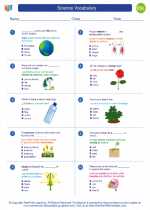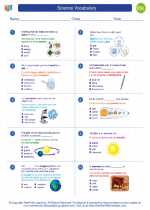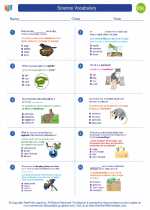Science Vocabulary
Science vocabulary is essential for understanding and communicating scientific concepts. It includes terms related to various scientific disciplines such as biology, chemistry, physics, earth science, and more. Mastering science vocabulary is crucial for students to excel in science classes and comprehend scientific texts.
Key Science Vocabulary Terms
1. Atom
An atom is the basic unit of matter, consisting of a nucleus containing protons and neutrons, with electrons orbiting around it.
2. Ecosystem
An ecosystem refers to a community of living organisms interacting with each other and their physical environment.
3. Photosynthesis
Photosynthesis is the process by which green plants and some other organisms use sunlight to synthesize foods with the help of chlorophyll.
4. Force
Force is a push or pull upon an object resulting from the object's interaction with another object. It can cause an object to accelerate, decelerate, or change direction.
5. Conduction
Conduction is the transfer of heat or electricity through a substance without perceptible motion of the material.
Study Guide
1. Definitions
Memorize the definitions of key science vocabulary terms. Create flashcards or use mnemonic devices to help remember the meanings of each term.
2. Contextual Usage
Practice using science vocabulary terms in sentences to understand their contextual usage. This can help reinforce the meanings and improve retention of the terms.
3. Interactive Activities
Engage in interactive activities such as quizzes, crossword puzzles, or word searches focused on science vocabulary. This can make learning more enjoyable and effective.
4. Visualization
Create visual aids such as concept maps or diagrams to connect science vocabulary terms with related concepts. Visualization can enhance understanding and memory retention.
5. Application
Apply science vocabulary terms in real-life scenarios or experiments to solidify their meanings and relevance in scientific contexts.
By mastering science vocabulary, students can enhance their scientific literacy and excel in their academic pursuits.



